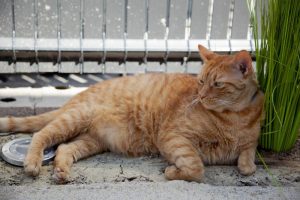Quick Navigation
Many things might keep your cat from coming inside, and it’s worrying for your cat to stay outside more than usual.
Your cat might not want to come inside, including; unsafe interiors, feeding them outside, a new cat in your house, new furniture, and sickness/injury.

When you notice your cat staying out more than it used to, you should find out why and convince it to return to the house.
Here are 7 reasons why your cat may not want to come inside the house:
1. Pregnant Cat
It is usual for cats to hide when pregnant, which could be why your cat cannot come inside the house.
Pregnant cats always seclude themselves outside, looking for a safe and private place to give birth to their kittens.
Naturally, pregnant cats tend to disappear for a while and return after giving birth.
What To Do
First, confirm whether your cat is pregnant by consulting a vet.
If your cat is pregnant, find a quiet, secluded, and peaceful space inside your house for it to stay there.
A secluded space will prevent your pregnant cat from staying outside the house.
2. Neglect & Abadonment
Cats feel abandoned when their owners fail to provide adequate food and Water.
In addition, when left alone for many days, cats naturally adjust to survival mode and go outside to search for food and Water.
If a cat finds an excellent shelter, it might not want to come back inside the house.
What To Do
Make sure you provide your cat with adequate food and Water.
Also, don’t live your cat alone for an extended period.
3. Outdoor Feeding
One major mistake pet owners make to feed their cats outside the house.
During certain seasons like summer, cats may prefer staying outside because of the warm weather.
When a cat is fed outdoors, it may not see reasons to come back inside.
For those who don’t feed their furry friends from outside, a neighbor may be feeding your cat, and that’s why it no longer wants to come inside.
What To Do
Try feeding your cat from inside or moving the food bowl slowly until you have it inside the house.
Also, you can wait for the summer season to end, and your cat will return inside on its own.
4. Invasion of Its Territory
If another cat invades your feline’s territory, there is a high chance that your cat won’t come inside.
Cats usually mark their territories by urinating on the wall or even flapping.
Therefore, if another cat passes through your cat’s flap, your cat detects it and declines to come in.
What To Do
Investigate and find out if there is a new cat in the neighborhood.
If yes, mark your cat’s territory to prevent other cats from encroaching.
Marking your cat’s territory helps you to be at ease, and it helps your cat to adapt.
5. Stress & Fear
A cat may decide not to enter a house because it no longer feels safe there.
Strass and fear in your cat may be because of a new person in the house, a new pet, or strange noises.
If a person is hitting the cat or if the cat feels unsafe with a new family member, it might stay away from your home.
Additionally, if you’ve just acquired a new dog, the cat may be frightened, and that’s why it may be staying outside.
Also, strange noises like bangs or unusual sounds in the house may frighten the cat away.
What To Do
In the case of a new dog, you should introduce your cat to the dog so they can get to know each other.
If they click and get along, that will be good news. But you will have to make a tough choice if your cat and dog don’t get along.
Also, find out why your cat is suddenly fearful and eliminate the reason immediately.
6. Sick Cat
Your cat may not come inside because it is not feeling well.
Most cats tend to hide their sickness or injury by staying away from their pet owners.
Your sick cat’s response may be to stay outside. Also, the cat may have an injury, trying to hide it from you.
And if she goes to the toilet outside, she may feel the need to stay out so that she doesn’t get out more often to pee or poo.
What To Do
If you realize this behavior from your cat, scrutinize it the next time she is near you.
Afterward, visit your veterinarian to know if the cat is sick or not.
7. New House Items
The truth is that cats love their environments.
Naturally, cats are territorial creatures and greatly attached to their spaces.
When cats sense new items or things in the house, they get anxious, and in some cases, they freak out.
Therefore, your cat may refuse to enter the house because it has sensed danger or a change in its environment.
For instance, new furniture, doorknobs, and mats can significantly impact cats and their environment.
What To Do
After buying new items in the house, ensure your cat gets used to them.
Make your cat understand that these new items mean no harm to them.
Also, be patient and teach your cat to accept the new house changes slowly.
Bottom Line
Different reasons may cause your cat not to come inside the house.
A cat may refuse to enter the house when it feels endangered or sick, or its dwelling place has been destroyed.
Quickly detecting why your cat stays outside may help save your cat and other animals that your cat may endanger.
With this information, feel free to go ahead and determine why your cat is not coming inside the house and implement the highlighted strategies to bring it back.

Purrfect n’ Pawesome is the brainchild of Amanda, who has been into researching and writing about pets to help other pet parents in nurturing their adorable pets. Currently, she runs Purrfect n’ Pawesome along with her team of experienced and dedicated pet experts. Along with being an awesome writer and entrepreneur, Amanda is a cat mom to two innocently spoiled cats, Balanca and Scruffy.
She has been writing about pet care and nurturing and wants to share her readers’ experiences, learnings, and knowledge.
Over the years, she had the opportunity to work with various pet owners having multiple breeds, and that exposure gave her experience and the lessons of a lifetime.
Her family, her entire universe revolves around her two cats, who give her endless support and inspiration to move ahead with her objectives in life. Amanda is a live example of a balanced approach to all parenthood questions we all face in life.






![Why Does My Cat Lay On Me All Of A Sudden? [ 7 Reasons] Why Does My Cat Lay On Me All Of A Sudden? [ 7 Reasons]](https://purrfectnpawesome.com/wp-content/uploads/2021/01/Why-Does-My-Cat-Lay-on-Me-All-of-a-Sudden-150x150.jpg)